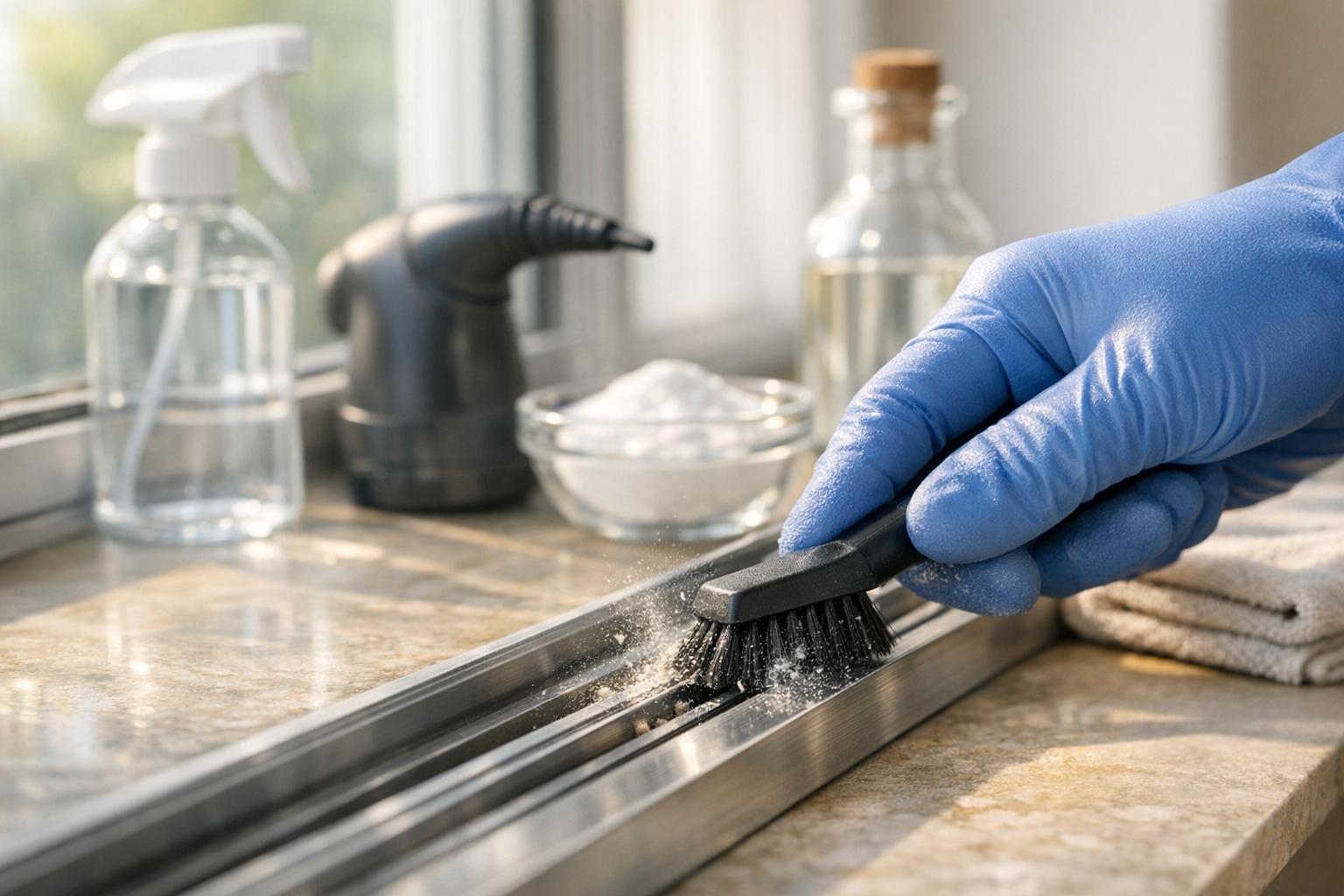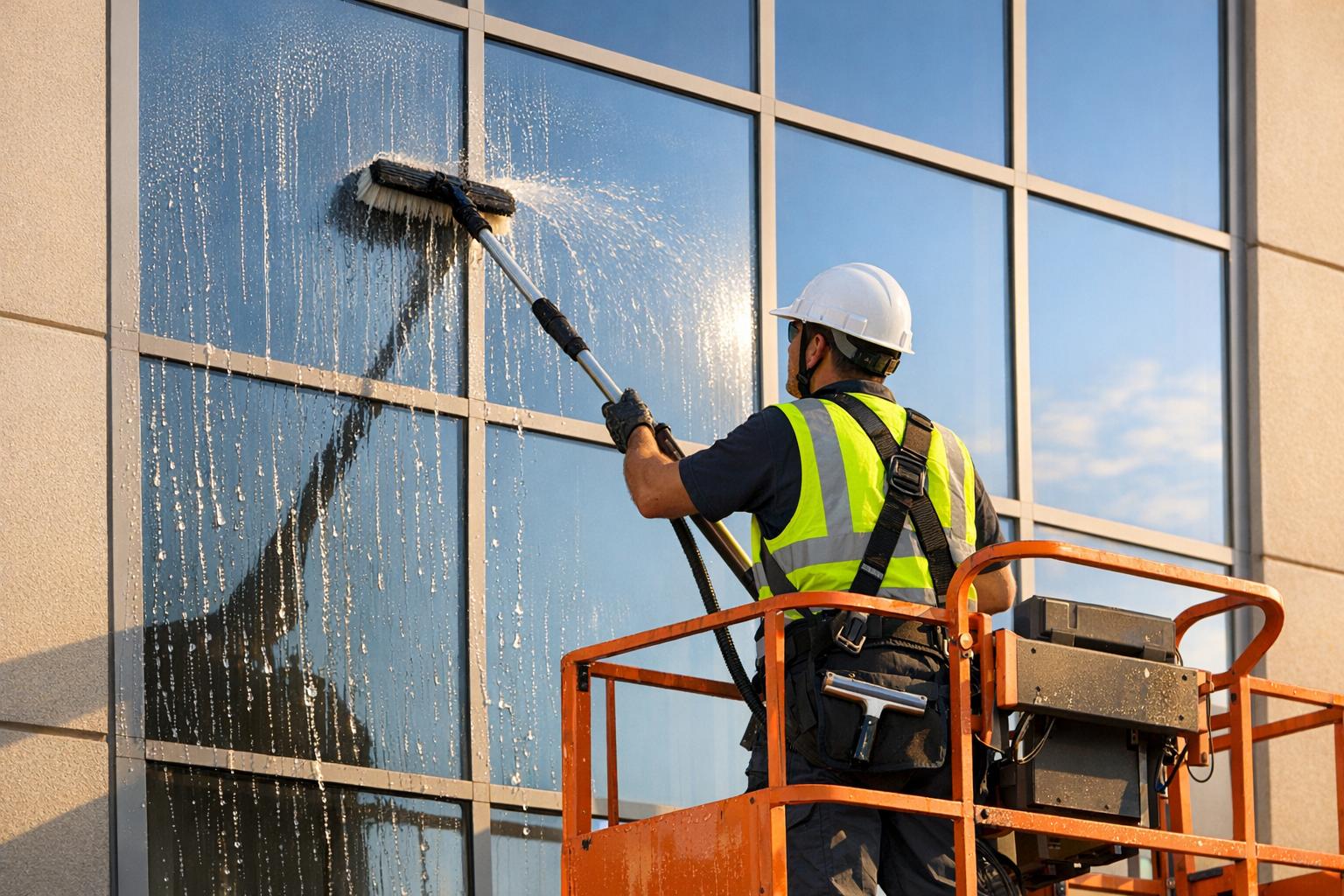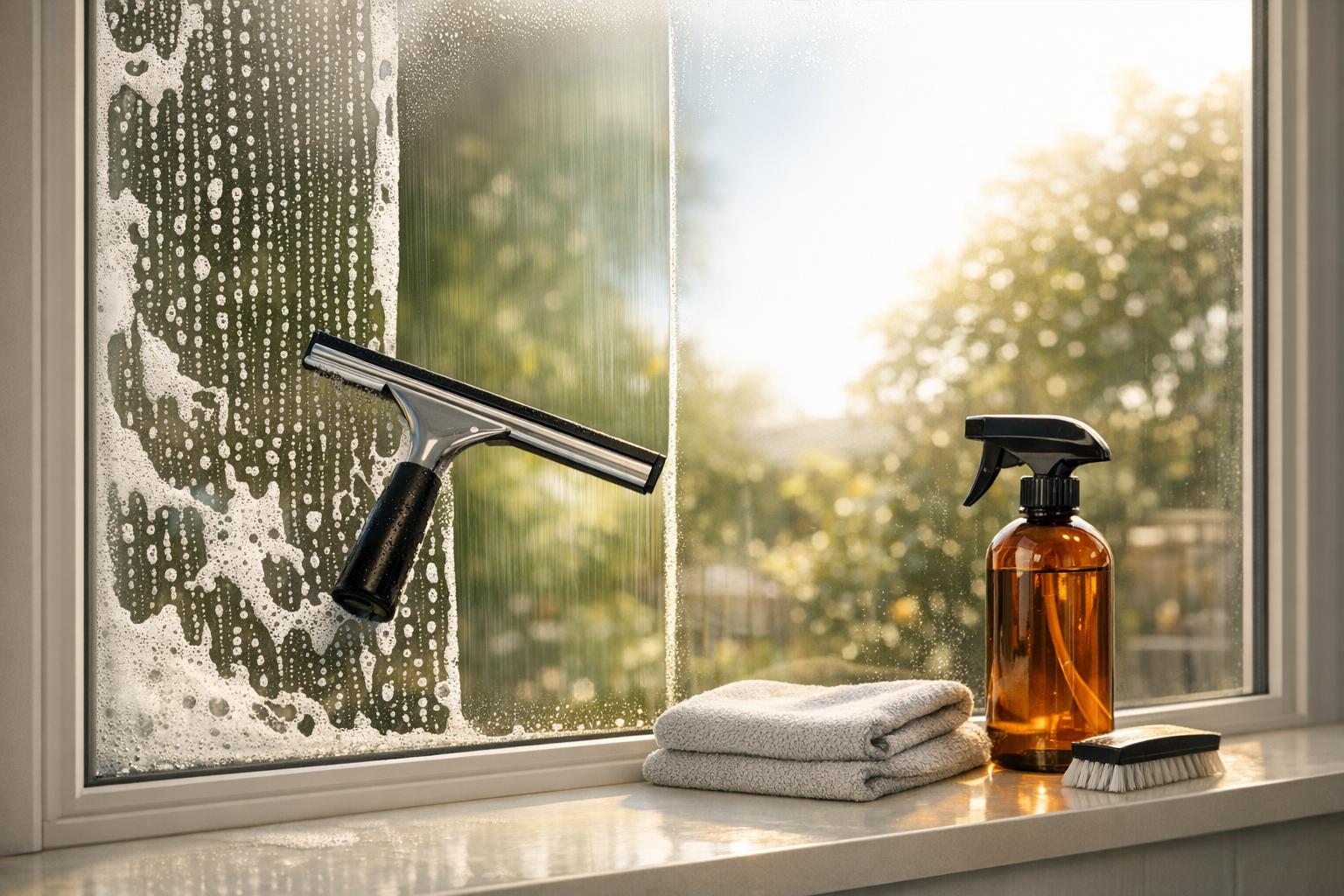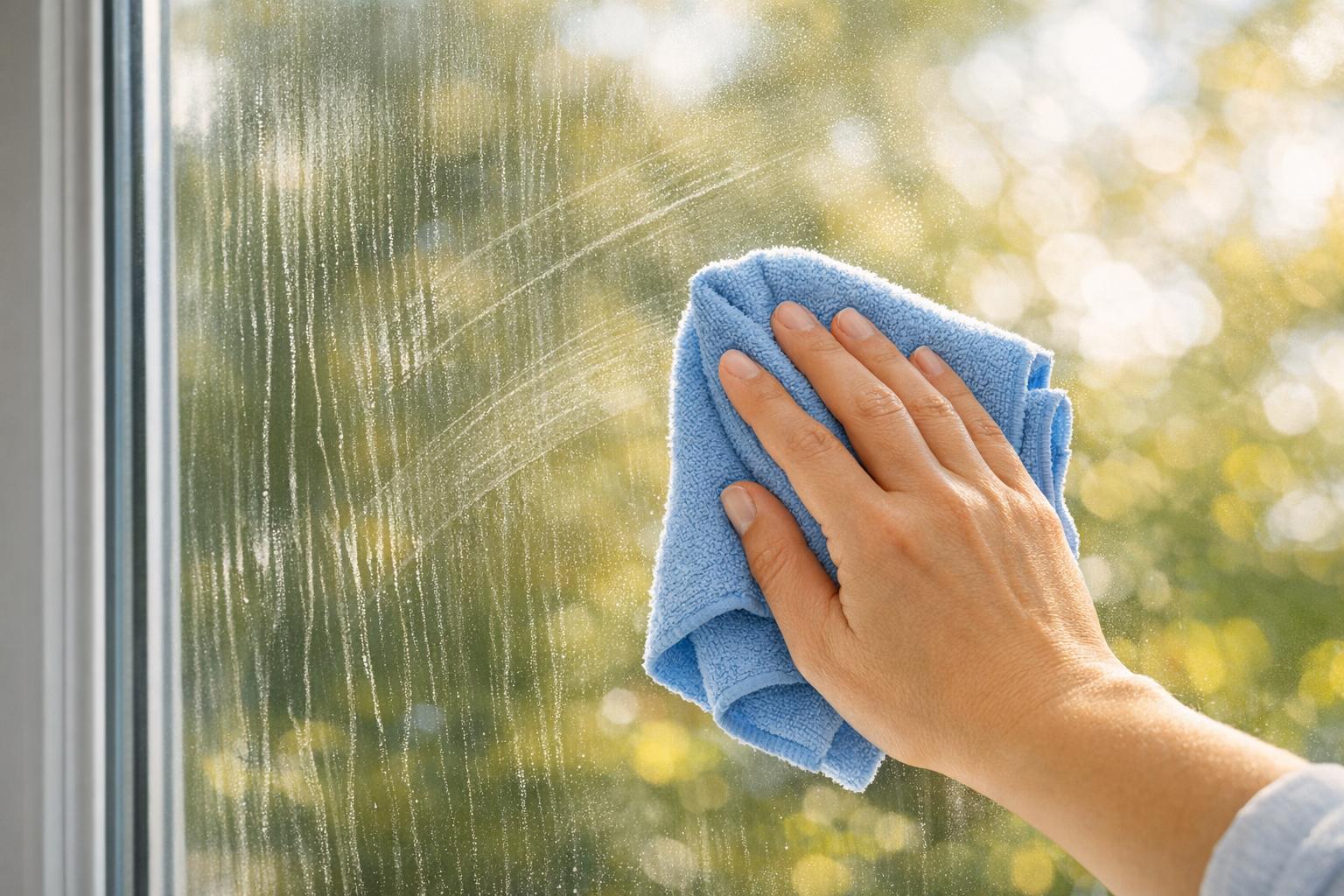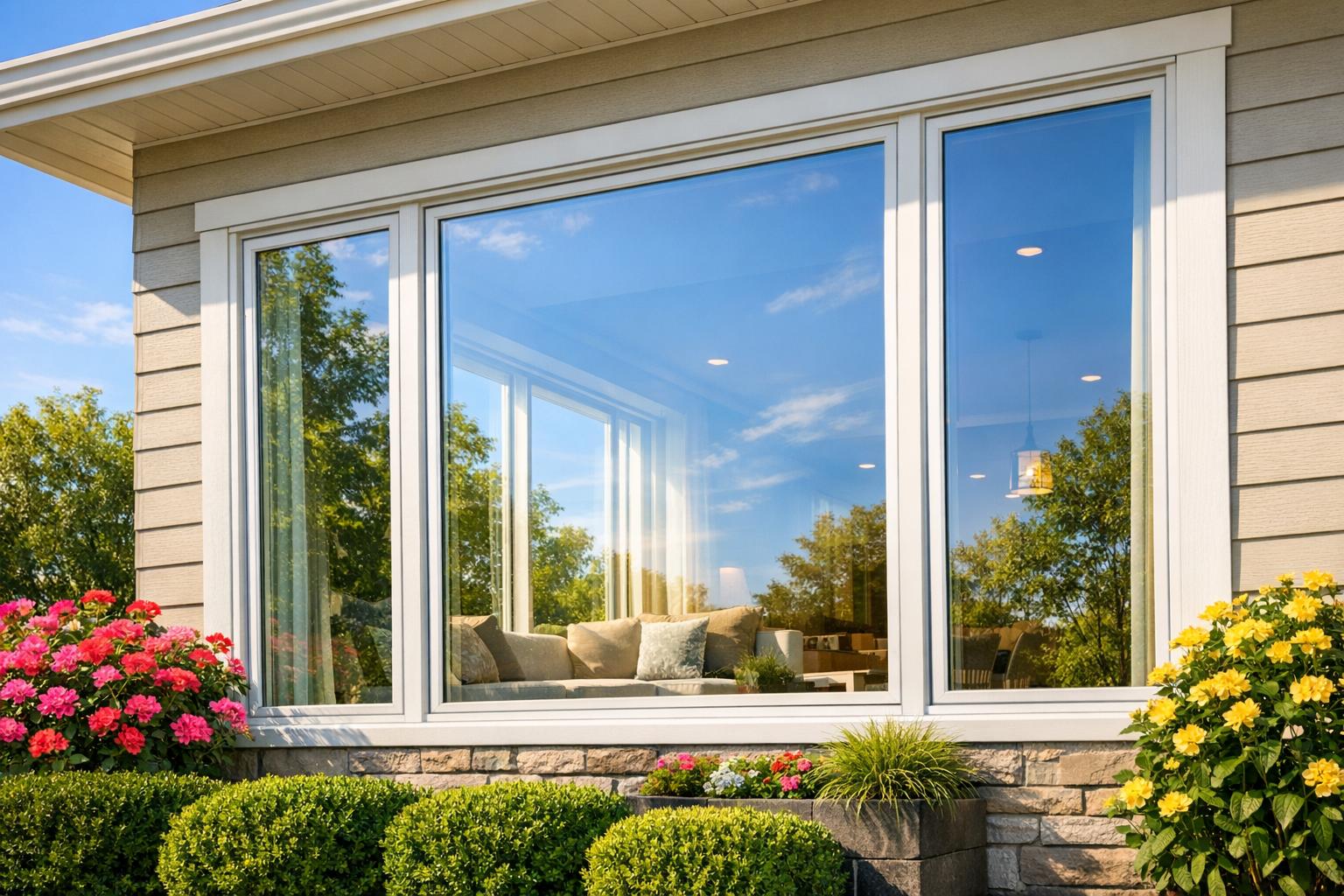Our Blog
5 Ways To Prevent Hard Water Stains On Windows
Hard water stains can ruin the look of your windows and cause permanent damage if left untreated. Here are 5 simple ways to prevent them:
- Clean Regularly: Wipe windows often and dry them properly using microfiber cloths or squeegees to prevent mineral buildup.
- Use Glass Sealants: Apply a protective coating to repel water and make cleaning easier.
- Fix Water Sources: Adjust sprinklers, manage roof runoff, and use drip irrigation to keep mineral-rich water away from windows.
- DIY Solutions: Use vinegar, lemon juice, or baking soda to clean stains naturally and prevent new ones.
- Hire Professionals: Professional services can deep clean, apply protective treatments, and maintain your windows long-term.
Quick Overview
| Method | Key Benefit | Cost Range |
|---|---|---|
| Regular Cleaning | Prevents buildup and stains early | Low (DIY supplies) |
| Glass Sealants | Shields glass from water and stains | $10–$50 per bottle |
| Fix Water Sources | Redirects water away from windows | $10–$50 (tools) |
| DIY Solutions | Budget-friendly natural cleaning | Low (household items) |
| Professional Services | Deep clean and long-term protection | Varies ($50+/service) |
Preventing hard water stains saves you time, money, and keeps your windows looking clear and lasting longer.
APPLYING MR. HARD WATER PROTECTANT SEALENT FOR WINDOWS AND SHOWER DOORS
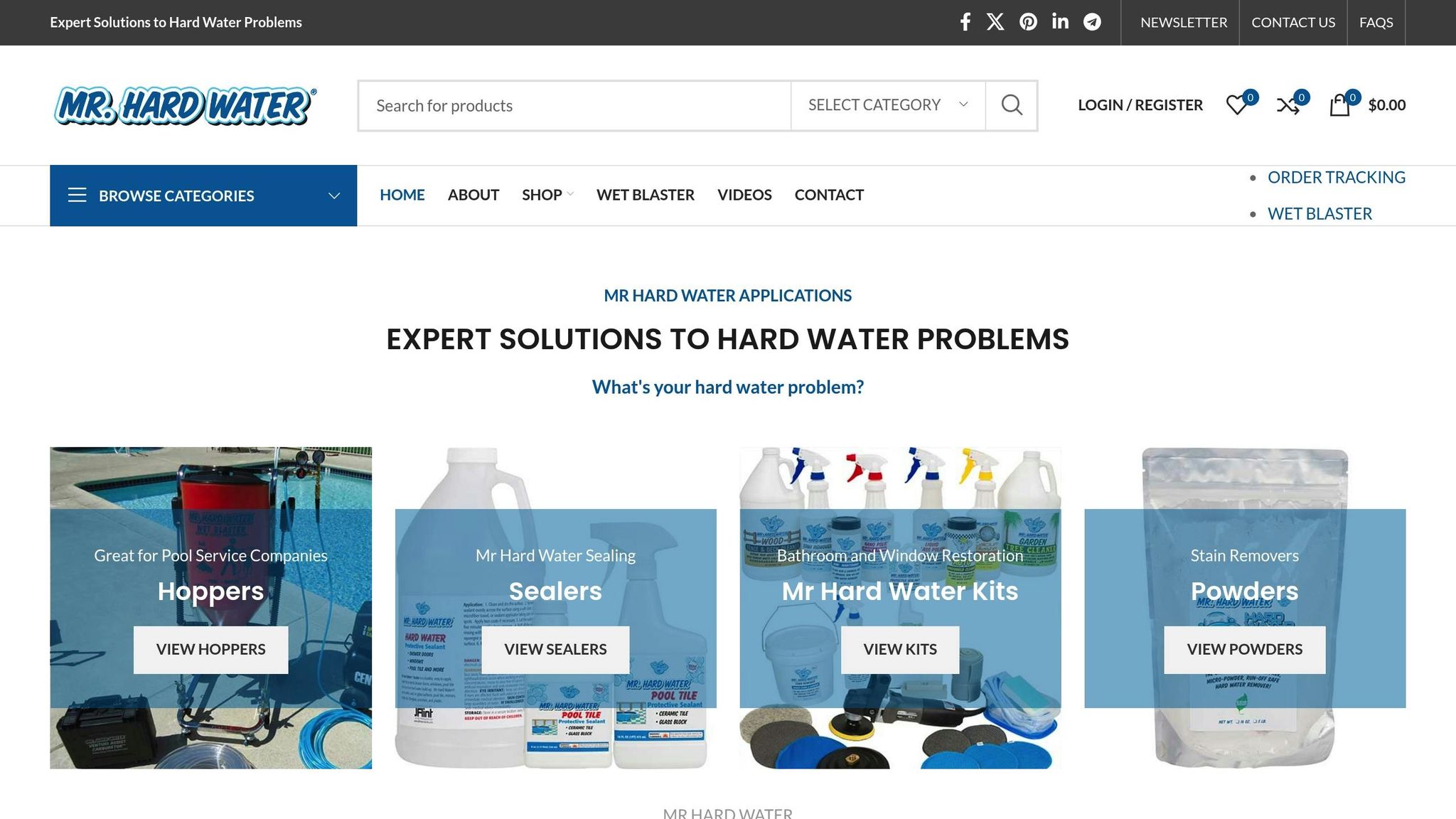
1. Clean Your Windows Regularly
Keeping your windows clean on a regular basis is the best way to avoid hard water stains. By tackling mineral-rich water droplets before they dry, you can save yourself the hassle of scrubbing off stubborn residues later. Plus, it ensures your windows stay clear and spotless all year. Here's how you can maintain stain-free windows with ease.
1.1 How Often to Clean Windows
If your windows are frequently exposed to water from sources like sprinklers or roof runoff, you'll need to adjust how often you clean them based on this exposure. More frequent cleaning in these areas can help you stay ahead of mineral buildup.
1.2 Dry Windows Properly
Drying your windows the right way is just as important as cleaning them. Use lint-free microfiber cloths to avoid leaving behind fibers that can mar your hard work. If you prefer using a squeegee, make sure to wipe the blade clean after each swipe to prevent streaks. Don’t forget to dry the edges of the glass with a clean cloth - this stops water from dripping and forming new spots.
For the best results, clean your windows on cloudy days to avoid rapid drying, which can cause streaks. Try using a two-rag method: first, wipe the glass with a damp cloth soaked in your cleaning solution, then immediately dry it with a clean, lint-free cloth.
1.3 Make Your Own Cleaning Solution
You don’t need pricey cleaners to tackle light mineral deposits. Homemade solutions are not only effective but also easy on your wallet. For everyday cleaning, mix equal parts water and white vinegar in a spray bottle. Spray it on the glass and let it sit for about 30 minutes to break down mineral deposits. Another option is to mix 1/4 cup of rubbing alcohol with 1 cup of water - this solution evaporates quickly, which helps reduce streaking.
For tougher spots, you can make a paste using equal parts baking soda and water, then apply your vinegar solution over the paste for an extra cleaning boost.
"Vinegar is a great natural cleaner for eliminating hard water build-up because its acidity breaks down the deposits."
– Jennifer Parnell, co-founder of Humble Suds
These simple, budget-friendly methods are perfect for routine maintenance. With proper drying and regular use of homemade solutions, you can handle mineral deposits before they turn into permanent stains.
2. Apply Glass Sealants
Glass sealants act as an invisible shield for your windows, helping to repel mineral-laden water and protecting against the etching caused by hard water stains. Over time, these stains can permanently damage your glass, but sealants create a Teflon-like barrier that prevents water droplets from sticking and leaving behind residue.
When applied, glass sealants cause water to bead up and roll off the surface, which minimizes mineral buildup. This not only protects your windows but also makes future cleaning a breeze - any lingering spots can be wiped away with minimal effort.
"Glass sealants can reduce how much mineral buildup clings to your surfaces." - Quality Home Products of Texas
Here’s how to choose and apply the right sealant for your windows.
2.1 Pick the Right Glass Sealant
The best glass sealant for you will depend on your needs and budget. Sealants are typically available in two main forms: spray-on and wipe-on. Both are effective, but spray-on options are often preferred for covering larger areas quickly and evenly.
For example, products like Mr. Hard Water Glass Sealer can cover up to 200 square feet with just an 8-ounce bottle. This versatile option works on various surfaces, including glass, mirrors, metals, tile, fiberglass, porcelain, and plastic.
"Mr Hard Water Sealer seals and protects shower doors and windows against the build-up of soap and hard water, eliminating the need for a daily squeegee." - Mr. Hard Water
If you're considering professional help, services typically charge around $50 per square meter for single-sided glass treatment, though pricing can vary based on the complexity of the job.
When shopping for sealants, focus on products that advertise long-lasting protection and compatibility with your specific type of glass. While cheaper options might seem appealing, they often require frequent reapplication, which can be less cost-effective over time.
2.2 Apply Glass Sealant Correctly
Getting the most out of your glass sealant starts with proper preparation and application. Begin by ensuring your windows are completely clean. Any dirt, soap residue, or mineral buildup left behind will prevent the sealant from adhering properly.
For stubborn spots, use 0000 steel wool along with a razor blade to gently remove any film or residue. This ultra-fine steel wool is safe for glass when used carefully and won’t cause scratches.
Once the surface is spotless, follow the product instructions for application. Most sealants can be applied using a cloth, sponge, or spray applicator. Work in small sections to ensure even coverage and avoid applying the sealant in extreme weather conditions.
After applying the sealant, buff the surface with a clean towel to help distribute the coating evenly and allow it to set properly. Once buffed, let the sealant cure for 24 to 48 hours, depending on the temperature and humidity.
Plan to inspect your sealant every one to two years and reapply as needed. While high-quality sealants can last up to ten years, they are typically most effective within the first four years of application. Factors like weather exposure and the quality of the sealant can impact its longevity.
3. Fix Water Sources Around Your Windows
One simple way to prevent hard water stains on your windows is by redirecting water sources around your home. Often, homeowners unknowingly cause these stains through poorly placed sprinkler systems or inadequate roof drainage. By addressing these issues, you can stop mineral buildup before it even begins.
The best part? Most of these fixes are straightforward and require minimal tools. Start by adjusting your irrigation system to keep water away from your windows.
3.1 Adjust Your Sprinkler System
Your sprinkler system might be the main reason behind those pesky hard water stains. Sprinklers that spray directly onto windows leave behind calcium and magnesium deposits every time the water evaporates, especially in areas with hard water.
To avoid this, ensure your sprinkler heads are positioned at least 6–8 feet away from windows. This distance helps prevent overspray and accounts for wind drift. If moving the sprinkler heads isn’t an option due to landscaping, adjust the spray pattern instead. Many modern sprinkler heads allow you to modify the direction and width of the spray, so you can redirect water away from your windows while still covering your lawn and plants.
For plants near windows, consider switching to drip irrigation systems. These systems deliver water directly to the roots, avoiding splashing or overspray onto nearby glass surfaces. Plus, they use less water, making them a smart and eco-friendly choice.
Another option is to create natural barriers to block water spray. Strategically placing plants, small fences, or decorative walls can act as shields, protecting your windows from irrigation overspray. This approach is especially helpful if you need to keep your current sprinkler setup to maintain proper lawn coverage.
While fixing your sprinklers is essential, don’t forget about managing water runoff from your roof.
3.2 Control Roof Water Runoff
During heavy rain, roof runoff can dump large amounts of mineral-rich water onto your windows, particularly if your gutters and downspouts aren’t properly positioned. The solution? Redirect that water before it reaches your windows.
Start with downspout extensions, which carry rainwater 3 to 5 feet away from your home’s foundation and windows. These extensions are affordable, costing between $10 and $50. Pair them with splash blocks - concrete or plastic devices that sit under your downspouts to evenly disperse water flow and prevent concentrated streams from hitting nearby surfaces.
"Essentially, you want to manage stormwater runoff to decrease its volume and prevent pollution." - U.S. Environmental Protection Agency (EPA)
For heavy runoff, try roll-out drain sleeves. These flexible sleeves attach to your downspouts and automatically unroll during rainfall, directing water even further away from your home. They’re an affordable upgrade, typically costing $15 to $30 per sleeve.
You can also explore decorative and functional options like rain chains or rain diverters. Rain chains guide water from your roof into collection areas or away from windows, adding a stylish touch to your home. Rain diverters, on the other hand, are ideal for problem areas where water tends to concentrate. Installed directly on your roof, they split the water flow and redirect it away from your windows. Both options are effective and corrosion-resistant, making them durable solutions for managing roof runoff.
sbb-itb-4ae7296
4. Try DIY Prevention Methods
Using simple household ingredients, you can tackle hard water stains effectively without resorting to harsh chemicals. These DIY solutions are not just budget-friendly - they also provide an eco-conscious way to keep your windows clean, complementing regular maintenance and professional treatments.
4.1 Use Vinegar Solutions
White vinegar is a go-to option for combating hard water stains. Its natural acidity dissolves calcium and magnesium deposits, making it an excellent choice for clearing up existing stains and preventing new ones. Plus, it’s non-toxic, safe for kids and pets, and environmentally friendly.
"White vinegar's mild acidity makes it highly effective at dissolving mineral deposits, grease, and everyday dirt that accumulates on windows...unlike commercial cleaners, it leaves no chemical residue behind." – Amazing Finish Windows
Start by mixing equal parts white vinegar and water in a spray bottle. For tougher grime, add a few drops of dish soap. Spray the solution generously onto your windows and let it sit for about a minute to loosen the mineral buildup. Then, wipe the glass with a microfiber cloth using a circular or zig-zag motion, and finish by buffing with a dry cloth to eliminate streaks.
For best results, clean your windows on cloudy days to prevent the solution from drying too quickly, which can leave streaks. Using distilled water instead of tap water in your mixture can also help avoid introducing new mineral traces. Regular weekly cleaning can keep stains from becoming stubborn and difficult to remove over time.
If vinegar isn’t your favorite option, you can achieve similar results using lemon juice, which offers a fresh scent and effective cleaning power.
4.2 Combine Dish Soap and Lemon Juice
Lemon juice, with its natural citric acid, is another effective way to dissolve mineral deposits. When combined with dish soap, it creates a powerful cleaning solution that leaves windows streak-free and smelling fresh. The grease-cutting properties of dish soap make this mixture even more effective.
To make the solution, squeeze the juice of one or two fresh lemons (depending on how much you need) and mix it with a few drops of liquid dish soap. Add this mixture to distilled water for a streak-free finish. A good starting ratio is the juice of one lemon and a teaspoon of dish soap per cup of distilled water, but you can adjust the proportions as needed.
Spray the solution onto your windows, let it sit for a minute, and then wipe it off with a microfiber cloth. The dish soap helps the solution cling to vertical surfaces, giving the citric acid time to work its magic on the stains.
Safety and Best Practices
Before diving in, test your cleaning solution on a small, hidden area to ensure it won’t react negatively with your glass or window frames. Avoid abrasive tools like scouring pads or steel wool, as these can scratch the glass. Make sure the solution doesn’t dry on the glass, as this can leave streaks or a hazy film. Rinse thoroughly with clean water after cleaning to remove any residue.
For streak-free results, try using horizontal strokes on interior windows and vertical strokes on exterior ones. If you have sensitive skin, wear gloves while handling these solutions, and always work in a well-ventilated area. Lastly, avoid cleaning on hot, sunny days, as the solution might dry too quickly, leaving streaks behind.
These simple DIY methods can make a big difference in keeping your windows clean while being gentle on both your wallet and the environment.
5. Hire Professional Window Services
While DIY methods can handle routine upkeep, professional window services go the extra mile by tackling deeper issues and helping your windows last longer. Professionals use specialized tools and techniques to deliver streak-free results and protect against hard water stains. This approach not only keeps your windows looking great but also helps maintain their condition, saving you money in the long run.
Another advantage of hiring professionals is their efficiency. They deliver superior results in a fraction of the time it takes to do it yourself. Plus, their trained eyes can spot potential problems, like damaged seals or frames, which might otherwise lead to costly repairs down the line. Clean windows aren’t just about aesthetics - they’re also energy savers. Dirt and hard water stains can block up to 40% of natural light, and since windows account for 25–30% of HVAC-related energy use, keeping them clean can help reduce energy costs.
5.1 Professional Cleaning Tools and Methods
Professional window cleaners rely on commercial-grade tools like deionized water systems, which remove minerals and leave no streaks or spots. Unlike off-the-shelf cleaning products that often leave behind residues from soaps, waxes, or alcohol, these systems ensure a spotless, streak-free finish.
5.2 Professional-Grade Protective Treatments
In addition to cleaning, experts apply advanced sealants and protective coatings to shield your windows from future damage. After removing hard water stains, they recommend sealing the glass to prevent stains from coming back. These coatings guard against sun damage and staining while reducing the need for harsh cleaners. For example, a golf course applied EnduroShield to its windows, which were exposed daily to water with 600–750 ppm of minerals. Two years later, the water still beaded up as if the coating had just been applied. Regular maintenance schedules also help prevent mineral deposits from causing permanent damage.
5.3 Window Cowboy Services in Charlotte

If you’re in Charlotte, Window Cowboy offers specialized services tailored to your needs. They use tri-filtered deionized water for exterior window cleaning, ensuring a spotless and long-lasting shine on windows, frames, sills, tracks, and crevices. As a licensed, insured, and bonded company, Window Cowboy provides a wide range of services, including interior and exterior window cleaning, screen cleaning, window tinting, and more.
Professional cleaning not only enhances the appearance of your windows but also improves energy efficiency by maximizing natural light and preventing expensive repairs in the future.
Conclusion: Keep Your Windows Clear and Stain-Free
Hard water stains don’t have to be a permanent problem for your windows. With regular cleaning, protective treatments, and some smart water management, you can keep your glass sparkling and maintain your home’s curb appeal.
Consistent maintenance is key. Thoroughly cleaning your windows and promptly drying them with a microfiber cloth can stop mineral deposits from forming and etching the glass. This not only makes future cleaning easier but also helps preserve the condition of your windows over time.
A simple 50/50 vinegar and water spray is a handy solution for dissolving mineral deposits. Combine this with smart water management - like adjusting sprinklers and controlling roof runoff - and you’ve got an effective defense against hard water damage.
Taking proactive steps can save you from the hassle of deep cleaning, reduce the risk of permanent glass damage, and even extend the lifespan of your windows. This means fewer costly replacements down the line.
For those in Charlotte, professional services like Window Cowboy offer advanced cleaning technology and protective treatments that go beyond what DIY methods can achieve. This ensures long-lasting results and enhances the effectiveness of your regular cleaning efforts.
Clean windows don’t just look great - they also let in more natural light, creating a brighter, more inviting space. By incorporating these strategies into your routine, you’ll protect your investment and keep your windows in top condition for years to come.
FAQs
How often should I reapply glass sealants to protect windows from hard water stains?
For optimal defense against hard water stains, it's a good idea to reapply glass sealants every 1 to 3 years. The exact timing depends on the specific product you’re using and how much water exposure the glass gets. Staying on top of this maintenance helps the sealant do its job and keeps your windows looking clean and streak-free.
How can I use vinegar and baking soda to prevent hard water stains on my windows?
To keep hard water stains at bay, start by mixing a paste using 3 parts baking soda and 1 part water. Use a soft cloth or sponge to gently scrub the window surface with this mixture. Once done, rinse the area thoroughly with a solution made of equal parts vinegar and water to tackle any leftover mineral deposits. Finally, dry the windows using a lint-free towel to prevent streaks or fresh spots from forming.
For regular upkeep, spray your windows with a vinegar-water solution on a consistent basis. This will help break down mineral buildup before it becomes stubborn. Following this simple routine can keep your windows spotless and clear, no matter the climate across the US.
How can I adjust my sprinkler system to stop water from hitting my windows and causing stains?
To keep water away from your windows, start by adjusting your sprinkler heads so they don’t spray toward your home. You can also tweak the spray radius and add adjustable nozzles or shields to better manage where the water goes. Make it a habit to regularly check and refine the spray pattern to ensure water only reaches areas that need it. These simple steps can help prevent hard water stains on your windows and keep them looking spotless for longer.






